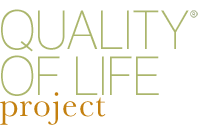The Quality of Life Project seeks to contribute to the growing worldwide movement of people who are focused on quality of life and measure it based on their level of satisfaction personally and professionally, are drawn to authentic and meaningful experiences, and are intent on leaving the world a better place while enjoying the journey along the way.
This worldwide movement towards quality of life comes as a result of many factors including:
- The increasing shift in society to understanding the importance of following one’s passions and pursuing a socially responsible way of life;
- The technology revolution of the late 20th century which has energized and enabled the professional class to take more ownership over their lives.
- The rapid growth of the positive psychology movement.
Today, there are over 200 universities in the U.S. with positive psychology departments feeding society’s demand for a better understanding of what drives quality of life and happiness. In 2002, the U.S. Department of Education provided a $2.8 million grant to Dr. Martin Seligman’s positive psychology department at the University of Pennsylvania to teach positive character traits to ninth graders. This initiative has the potential to become a nationwide initiative to teach quality of life skills to children through our public schools.
Several countries in the world today are using advances in positive psychology to develop quality of life indexes over GDP as a way to measure performance. The governments of Great Britain and Switzerland are studying ways to measure quality of life as a serious metric. And Bhutan has gained attention with its measurement of GNH (Gross National Happiness) over GDP. What better measurement of a government’s performance than the quality of life of its citizens?
